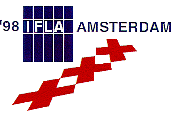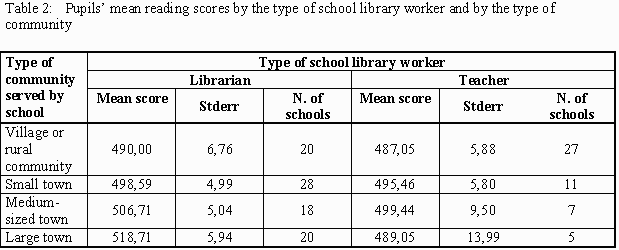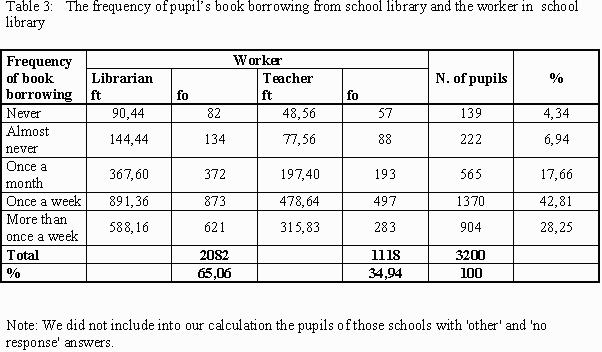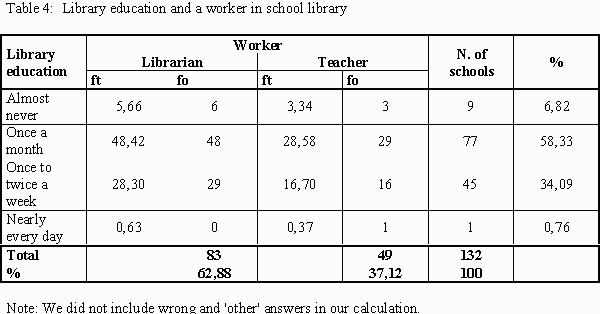
As of 22 April 2009 this website is 'frozen' in time — see the current IFLA websites
This old website and all of its content will stay on as archive – http://archive.ifla.org

As of 22 April 2009 this website is 'frozen' in time — see the current IFLA websites
This old website and all of its content will stay on as archive – http://archive.ifla.org





For the purposes of this survey we have defined the importance of librarian's contribution to the development of reading literacy by better achievements in reading literacy tests, which the pupils of the 3rd grade of elementary schools (140 classes and schools respectively were chosen for the representative sample: one class from each school) should have achieved if there was a library worker trained in librarianship employed in school library compared with the results of the pupils with a library worker without the knowledge of librarianship.
Therefore, the international questionnaire for the international study of reading literacy (Elley 1992) was added the following question: who performs the tasks and duties in school library?
School principles could choose between the following answers: librarian (knowledge of librarianship acquired by regular study or additional education), teacher (library worker without the knowledge of librarianship but with a passed professional exam for subject or class teacher), other (workers who did not suit any of the above mentioned possibilities). The replies were correlated with the results of the pupils in reading literacy tests. We calculated the mean scores achieved by the pupils of particular school in the reading literacy tests and the standard error (=stderr) of the mean score. With the deviations of the average scores from the collective one we displayed if the differences in test's results are higher or lower.

The 3rd grade pupils of 86 (61%) schools with the librarian employed in the school library scored 12 points higher average reading literacy test result than the pupils of 50 (36%) schools with the teacher employed in the library. We calculated the difference with t test after we omitted the "others" and "no response" groups because of the low numbers. The difference between the achievement of classes with the professional librarian employed in the school library and the achievements of classes with the professional teacher in the school library is statistically characteristic with 5 % degree of risk: (t=2,46 df=134 P<0,05).
At the primary level grade the worker with librarianship knowledge promotes more efficiently library and its stock in all fields of school life and work, also by teaching reading. S/he can be more proficient in presenting the role and importance of library, in organising and implementing motivation methods. The latter help pupils and teachers to experience library and its stock in the whole heterogeneous connection than can be presented by a teacher who does not know library and its integration into the library information system.
The results warn us that a librarian as a professional for acquiring, organising and selecting information can better than a teacher employed in school library advise by the selection and use of material, i. e. by the cognitive elements of information process. The librarian knows the access to secondary and tertiary information resources that provide information about material and its availability. S/he knows the elements of bibliographic and subject description of books, can interpret them and in this way s/he can faster and more adequately decide on the proper selection of material. There is much greater probability for a librarian to achieve that the right books, at the right time for the right user will be available in the right place than a teacher; the librarian uses also interlibrary loan if the material is not available in the school library.

The mean scores of reading results achieved by the pupils with a librarian in the school library are higher than the results achieved by the pupils with the teacher in the school library.
The data in the table show that the librarian is not (especially) effective corrective factor in the countryside, although also there the difference of three points shows his positive role in the development of reading literacy. Reading achievements of the pupils in the rural environment are lower than those of their contemporaries in the urban environment. Elley reported that our pupils scored the average of 488 points on the Rasch linear scale in the countryside, 497 points in small towns, 504 points in medium-sized towns and 513 points in large towns (Elley 1992). A librarian in the countryside cannot efficiently use her/his knowledge if other conditions for her/his work are not properly developed.
Teaching reading, learning to read and reading achievements of pupils depend on many factors. Efficiency of each individual factor is increasing with their appropriate development and it is related to their importance for the development of reading literacy. In our case, the urban environment with a variety of other motivation factors for reading, or at least more than in the countryside, and at the same time with better conditions for their efficiency, arouses more needs and higher pretentiousness of users' needs. Likewise, the number of librarians employed in school libraries is increasing.
These abilities are used by the librarian her/himself when s/he, according to the purpose of the library, collects, processes, arranges and displays library material. S/he is aware that s/he must know to identify users' needs, s/he must master the contents of information literacy, the use of information technology and other libraries in the library system. With this knowledge it is easier for her/him to carry into effect her/his professionalism and s/he increases the demand for library services and material which in return affects her/his higher professionalism. S/he is aware that s/he must provide this knowledge for the users so that they can become independent by using libraries, their material and different information sources.

The pupils of both groups, with the librarian or with the teacher appointed in the school library, very similarly satisfied their needs for books. However, the librarian had greater influence on the frequency of borrowing books in comparison with the teacher. The connection is statistically characteristic (?˛ = 17,795 df = 4 P < 0,005), but weak (C = 0,074). Both library workers are able to motivate children to return to the library but the difference in the reading literacy test results shows that both do not have the same possibilities and knowledge for developing reading skills. The frequency of borrowing books is like the number of borrowed books just one of the indicators of the efficiency of library, but on no account this is sufficient for evaluating the efficiency of library in the development of reading literacy. It does not say enough about the quality and variety of books which children borrow, about guidance and advising by selection, about use and understanding of library material etc. All these quoted tasks can be better performed by a qualified librarian in a well-organised library than by a worker without the knowledge of librarianship.
We were also interested if the librarian uses the advantages of knowing the library profession, especially the elements of selecting the right material for the right user at the right time by other activities as well.

The difference in the frequency of library education in which the classes were involved in if there was a librarian or a teacher employed in school library is not statistically characteristic (? ˛ = 1,363 df = 3 P > 0,05). The hypothesis was proved although we expected that the librarian would be the one who would attract more often the class teacher to include pupils in this form of learning. However, it is encouraging that library education has gained its place in almost all schools. This means that schools are aware of the fact that pupils must be taught to use this infinite source of information for lifelong education and for the fulfilment of other social needs. The results below show how efficient our performers were in this.

The large numbers of weekly and daily participation warn us that teachers misunderstood the question. We assume that they also counted other activities of the library into this form (fairy-tale hours, exhibitions, meetings with authors etc.), which our school libraries organise relatively a lot. In 1992 (Novljan 1994) there were, e. g. 3897 group pedagogic forms of book and library education in all 470 primary school libraries. Exhibitions and performances accompanying the reading-badge competition were organised by 365 libraries, discussions about books by 349 libraries, fairy-tale hours by 327 libraries and systematic library education by 314 libraries. However, only 134 libraries of these professionally adequately carried out these activities and had also professionally adequately organised material (i. e. they had more than three catalogues). The majority of these activities belong to important motivation factors for visiting library, for reading, but they do not belong to teaching reading and acquiring, selecting and using information respectively, which are the elements of library education. The possible reason that librarian did not achieve better results can be bad working conditions (which are a problem in most school libraries; besides professional knowledge librarian needs also a place for arranging library material and a place for pedagogic forms of work with users, technology - also computer and communication ones, and a regular financing for acquiring new material and an additional worker when there are more than 16 classes).
If we want to achieve that the quantity of motivation forms becomes equal with the quantity of methodical forms of library education and that the latter would grow into quality, it is necessary to include library into education process where it will systematically co-operate with its share in implementing the programme of information literacy. In this way questions how and why will be connected in the earning process and pupils will be able to search independently for answers to the questions how much, how and what.
Not only libraries but also the way of their use must be changed. What we need first is more frequent and closer co-operation between the teacher and the librarian, where the librarian must get the role of a teacher working as an instructor in a group offering possibilities to the participants in educational process to start valuing library and its contribution by searching, selecting and using information in gaining the knowledge according to the curriculum. It is as important that methods of teacher's work are changed where the need for librarian's co-operation will be necessary.
Besides gaining the concrete knowledge, abilities and skills the social dimension of school's work is carried out more easily if the methods of work are such that all participants of the educational process are working together in supporting individual's work. The social dimension of school's work is achieved when pupils learn with library material and not just from it and when school also imparts tolerance, criticism, responsibility, expressing views, self-fulfilment and social interest.
From library skills to information literacy (1994). - Colorado : California Media and Library Educators Association.
Henri, J. & L. Hay (1994): Beyond the bibliographic paradigm: User education in the information age. - Havana : 60th IFLA general conference, 21 - 27. avgust. Booklet 7, str. 63-71.
Novljan, S. & M. Steinbuch (1994): Šolska knjiznica v izobrazevanju za 21. stoletje. - Ljubljana : Narodna in univerzitetna knjiznica.
De Silva, R & A. Turriff (1993): Developing the secondary school library resource centre. - London : Kogan Paul.